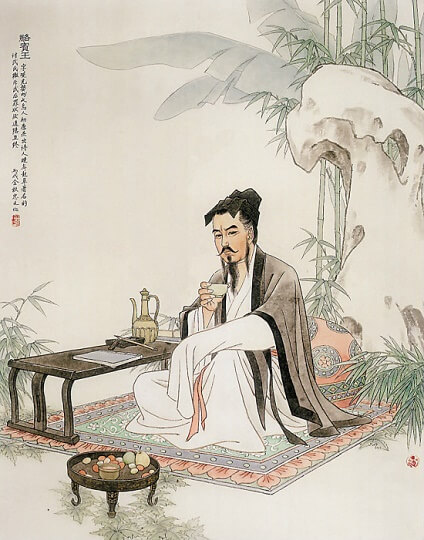A Political Prisoner Listening to a Cicada
- Poetry of Luo Binwang

While the year sinks westward, I hear a cicada
Bid me to be resolute here in my cell,
Yet it needed the song of those black wings
To break a white-haired prisoner's heart....
His flight is heavy through the fog,
His pure voice drowns in the windy world.
Who knows if he be singing still? - -
Who listens any more to me?
Five-character-regular-verse
During the reign of Empress Wu Zetian, Luo Binwang criticized the empress and engaged in a failed rebellion that landed him in prison. While sitting in prison, Luo composed a poem that lamented his desire to be declared as righteous. Centering his entire piece upon the song of cicadas, he expresses how their lively songs initially contrast with his gloomy existence, but in the end, are drowned out by the harsh reality of life. Even in the midst of his pain, Luo crafts beautiful poetry that contains contrasting word choices within each line: 西 (west) and 南 (south), 玄鬓 (black hair) and 白头 (white hair). This contrasting diction creates a sense of parallelism in the midst of the chaos of his life. Even more, piecing together fragments of his pain into articulate descriptions that provoke delicate imagery, such as dew weighing upon wings (露重飞难进) or music submerged by the wind (风多响易沉), he reveals that beauty can be found even in the midst of sorrow. By ending with a question to his readers, Luo reveals the uncertainty and hopelessness of his situation. Although he was executed shortly after composing this poem, Empress Wu Zetian, who, despite having been insulted by Luo, recognized and admired his poetic talent, sent others to collect and publish his works.
余禁所禁垣西,是法厅事也,有古槐数株焉。虽生意可知,同殷仲文之古树⑴;而听讼斯在,即周召伯之甘棠,每至夕照低阴,秋蝉疏引,发声幽息,有切尝闻,岂人心异于曩时,将虫响悲于前听?嗟乎,声以动容,德以象贤。故洁其身也,禀君子达人之高行;蜕其皮也,有仙都羽化之灵姿。候时而来,顺阴阳之数; 应节为变,审藏用之机。有目斯开,不以道昏而昧其视;有翼自薄,不以俗厚而易其真。吟乔树之微风,韵姿天纵; 饮高秋之坠露,清畏人知。仆失路艰虞,遭时徽纆。不哀伤而自怨,未摇落而先衰。闻蟪蛄之流声,悟平反之已奏;见螳螂之抱影,怯危机之未安。感而缀诗,贻诸知己。庶情沿物应,哀弱羽之飘零; 道寄人知,悯余声之寂寞。非谓文墨,取代幽忧云尔。
西陆蝉声唱,南冠客思深。
那堪玄鬓影,来对白头吟。
露重飞难进,风多响易沉。
无人信高洁,谁为表予心。
- Why Chinese poems is so special?
- The most distinctive features of Chinese poetry are: concision- many poems are only four lines, and few are much longer than eight; ambiguity- number, tense and parts of speech are often undetermined, creating particularly rich interpretative possibilities; and structure- most poems follow quite strict formal patterns which have beauty in themselves as well as highlighting meaningful contrasts.
- How to read a Chinese poem?
- Like an English poem, but more so. Everything is there for a reason, so try to find that reason. Think about all the possible connotations, and be aware of the different possibilities of number and tense. Look for contrasts: within lines, between the lines of each couplet and between successive couplets. Above all, don't worry about what the poet meant- find your meaning.
- · Treading on Grass: After Rain the Landscape’s Fair
- · Tipsy Verse
- · Seated with Fangweng
- · Rain and the Mountain
- · Prelude to Water Melody: Bows and Swords Venture Beyond the Pass
- · Spring in Qin Garden: Painted Prows Pierce the Sky
- · The Trader’s Joy
- · Seeking the Hermitage of the Reverend Yong
- · Dedicated to Yuan Danqiu’s Mountain Home
- · The Temple on the Summit